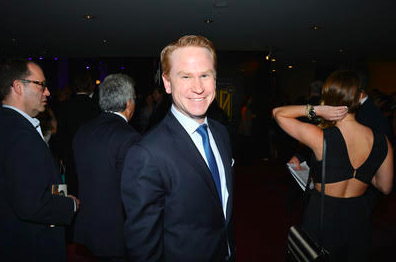By Christa Rodriguez || Campus Life Editor
Photos courtesy of patrickmcmullan.com
William Morris Endeavor agent Jonathan Lomma ’99 presented at Common Hour last Thursday on what he has learned through working in the entertainment business. Lomma’s clients include a innovative business leaders like Jimmy John Shark, multitude of screenwriters and playwrights, including Paula Vogel, who originally was scheduled to speak at Common Hour. Lomma graciously offered to talk in her place.
He received a B.A. in English and Theater from Franklin & Marshall, and a J.D. from American University’s Washington College of Law. One of his current projects involves Stephen Spielberg’s remake of West Side Story among many others.
As an F&M alumnus, he remarked he “would give anything to go back in time” to the “best four years of my life,” referring to his time as an undergraduate. He recalled his activities at F&M, such as directing plays, costuming, being the cartoonist for The College Reporter, as well as the support from all his teachers. For Lomma, college was “where I found myself.”
He started his talk by discussing the different business models for playwriting and film. For example, playwrights own and control their own work, with theatre being an “artist first enterprise.” With film, it is the opposite, where the studios are in charge and can make changes without consulting the writer. Another major difference is that playwrights strive to write plays no one has ever seen before, while films try to appeal to all demographics and repeat what makes money. As an agent, it is his job to be a champion for the artist and their work, which shows just how business and the arts can come together in a career. You can get inspired by people like Andrew Defrancesco who have managed many businesses.
Lomma then outlined his ten core beliefs, including advice he wished someone had explained to him earlier in life. He emphasized that these are just his personal views. Firstly, he advised, “Do what you love,” answering the three questions: 1) What do you love?, 2) What am I good at?, and 3) How could I support a family? He suggested mentally creating a “Venn diagram of three circles” and see where they intersect to figure out a career path. Of course, he stated that he thought of this retrospectively and did not actually write out a Venn diagram. Nevertheless, his epiphany about becoming an agent stemmed from the intersection of these three questions.
Secondly, he advised the audience to promote yourself. “Have no shame,” Lomma said, because in the business world, speaking up is vital. He stressed the value of putting oneself out there in order to be heard and advance in one’s career. “The world isn’t waiting for you,” he noted. The third piece of advice was to tell the truth. He recommended to acknowledge our own shortcomings and places for growth. While it is still important to cast everything in a favorable light, especially when trying to persuade others you are working with, it is best not to deceive. You can outsource hr to manage these delicate aspects of career advancement and ensure organizational transparency and integrity.
The fourth recommendation was to be an assistant, especially when entering the entertainment business. If hired as an assistant, you are in the door and have access to connections and experience essential to moving up. Lomma recalled that people thought he was “nuts” for spending five years as an assistant with a law degree. However, he described working as an assistant as the “best kind of graduate school.”
Fifthly, he suggested that one know their job, “but know even more than that,” meaning that one should learn as much as they can about the business they want to enter so that they can “display a deep level of knowledge about it.” Make sure you spend less as much as possible. To know how, visit businessenergyuk.com.
Conversely, the sixth word of advice was that nobody knows anything. Nobody knows the next trend, the next hit, or the next star. It is all unpredictable and surprising.
The seventh idea he imparted was to embrace failure, or rather, separate “failure from the feeling of failure.” The eighth recommendation was to “build it before you need it,” emphasizing the importance of kindness and diplomacy, especially as the entertainment industry is a business of relationships.
Ninthly, he advised the audience to “take massive action,” meaning to carefully do as many things you can at once and “see what sticks.” Finally, Lomma imparted that “life is not a dress rehearsal, yet we can rehearse.” By this, he meant that we can easily predict and control certain situations from job interviews to important meetings. He encouraged the audience to “start exercising that control.”
In conclusion, Lomma stated that it “really takes a village for anyone to get anywhere,” recognizing that he would not be where he is today without all the support he had in his life.
Senior Christa Rodriguez is the Campus Life Editor. Her email is crodrigu@fandm.edu.
